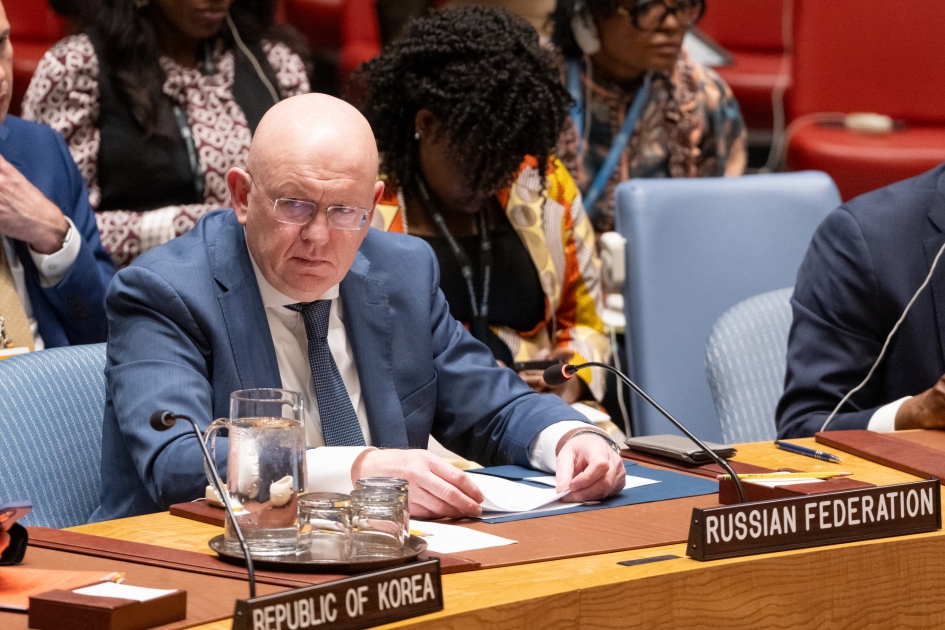Statement by Permanent Representative Vassily Nebenzia at UNSC debate on children and armed conflict
Mme.President,
We thank the delegation of Malta for organizing this meeting. We thank SRSG Gamba, as well as Mr.Chaiban and Mr.Niger-Thomas for their input in the discussion.
Access to humanitarian assistance is often the "road of life" in armed conflicts. Under international humanitarian law, it must be provided by all warring parties. When it comes to children in need, these obligations become a moral imperative. At the same time, the work of humanitarian actors must be based on the UN Charter and basic humanitarian principles, and must be conducted in close coordination with the affected state.
Global humanitarian aid encounters obstacles increasingly often. Humanitarian workers become victims of targeted attacks. For example, terrorists impede humanitarian access on the ground as a tactic to gain military advantage.
The politicization of the humanitarian sphere is also not conducive to the crucial goal of preventing and minimizing civilian suffering. In this context, the extremely negative impact of unilateral coercive measures on humanitarian access has not been getting the attention it deserves.
Such measures cause incalculable damage to children in countries in conflict. UCMs affect the entire social sphere; they impede the delivery of medicines and foodstuffs that are vital to children in need. The negative impact of unilateral sanctions is well illustrated in Syria, where they impede humanitarian assistance and access to basic services, as noted in the Secretary-General's reports. So-called humanitarian exemptions bring no relief. Today, UCMs are a form of denial of humanitarian assistance and must be addressed and assessed accordingly.
Mme.President,
An unprecedented humanitarian disaster is currently unfolding in the Gaza Strip, where Israel, in violation of its international obligations, has essentially blocked humanitarian access.
Israeli authorities used to deny humanitarian access to children even before the October 7 attack. For example, Israel had systematically prevented Palestinian children from traveling outside of Gaza to receive specialized medical care. In 2022 alone, five children died while waiting for approval of applications, as noted in last year's Secretary-General's report. But after the October 2023 events, Israel's actions with regard to humanitarian assistance to the Palestinians have assumed a striking scope and impact.
For more than six months now, all sorts of obstacles to the delivery of humanitarian aid have been created systematically. First, access to Gaza was completely blocked. Then the tactics of denying visas to humanitarian NGOs, endless red tape and inspections of humanitarian cargoes came into play.
The information war against UNRWA deserves a special mention. For that reason, the largest humanitarian agency was left without funding because of allegations that are still to be verified by the UN. Anyways, it is not clear why the allegations against 12 members of UNRWA should stop funding of an organization that has been the only source of sustenance for many Gazans.
Providing assistance to Gazans is related to lethal risks. We salute the heroism and dedication of all those who continue to aid the people of Gaza. Israeli rocket attacks on humanitarian facilities in Gaza, including schools and hospitals, have also resulted in the deaths of aid workers. Yesterday, Israeli shelling killed seven staff members of World Central Kitchen who were rescuing Gazans from starvation. Since last October, 196 humanitarian workers have been killed in Gaza as a result of Israeli shelling, the vast majority of them UNRWA staff. My question is if there is an investigation into the deaths of those people. What does the Organization do to protect its staff?
Mme.President,
Gaza’s blockade by Israel has already led to mass hunger. Children in the north of the enclave are now starving to death. In that connection, we condemn the decision by the Israelis to prohibit the sending of UNRWA food convoys to that part of Gaza. Unless the overall situation changes, a similar fate awaits children throughout Gaza. The current volume of humanitarian deliveries, arriving by both air and sea, does not suffice to improve this terrible situation.
According to the UN, the number of people who are already facing mass starvation is 1.1 million. This is half of the population of the Gaza Strip.
Denial of humanitarian access is only one of the grave violations against children that are taking place in Gaza these days. Children die and suffer there every day. Since the beginning of the escalation, more than 13 thousand children have died and thousands more gone missing. The major part of schools and hospitals have been destroyed. Starting October 2023, not no child in Gaza has had access to education.
In that regard, we call on SRSG Gamba to visit Gaza as a matter of priority to assess the situation of grave violations against children. We call on the Israeli Government to ensure the Special Representative's immediate access to the region. We would also like to ask SRSG Gamba and Mr.Chaiban if there are currently any obstacles to visiting the Gaza Strip.
Mme.President,
We trust that resolution 2728, adopted by the UN Security Council on March 25, will contribute to at least a temporary improvement of the situation in Gaza during Ramadan and, among other things, to increasing the supply of humanitarian aid to the enclave. We assume that this legally binding decision of the Security Council will be implemented immediately. So far, we have seen it being violated on a daily basis.
Thank you.
